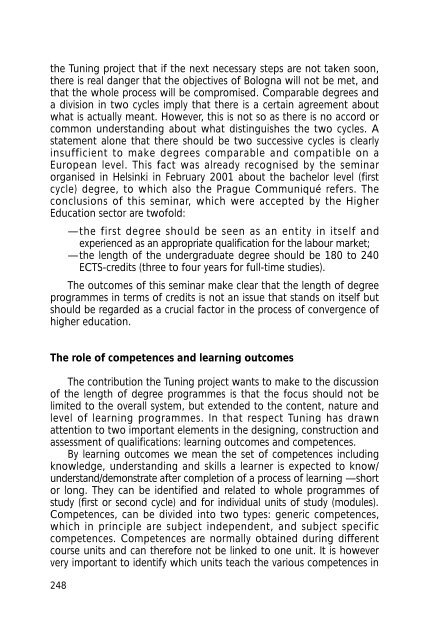Final Report Pilot Project - Relaciones Internacionales de la ...
Final Report Pilot Project - Relaciones Internacionales de la ...
Final Report Pilot Project - Relaciones Internacionales de la ...
Create successful ePaper yourself
Turn your PDF publications into a flip-book with our unique Google optimized e-Paper software.
the Tuning project that if the next necessary steps are not taken soon,<br />
there is real danger that the objectives of Bologna will not be met, and<br />
that the whole process will be compromised. Comparable <strong>de</strong>grees and<br />
a division in two cycles imply that there is a certain agreement about<br />
what is actually meant. However, this is not so as there is no accord or<br />
common un<strong>de</strong>rstanding about what distinguishes the two cycles. A<br />
statement alone that there should be two successive cycles is clearly<br />
insufficient to make <strong>de</strong>grees comparable and compatible on a<br />
European level. This fact was already recognised by the seminar<br />
organised in Helsinki in February 2001 about the bachelor level (first<br />
cycle) <strong>de</strong>gree, to which also the Prague Communiqué refers. The<br />
conclusions of this seminar, which were accepted by the Higher<br />
Education sector are twofold:<br />
—the first <strong>de</strong>gree should be seen as an entity in itself and<br />
experienced as an appropriate qualification for the <strong>la</strong>bour market;<br />
—the length of the un<strong>de</strong>rgraduate <strong>de</strong>gree should be 180 to 240<br />
ECTS-credits (three to four years for full-time studies).<br />
The outcomes of this seminar make clear that the length of <strong>de</strong>gree<br />
programmes in terms of credits is not an issue that stands on itself but<br />
should be regar<strong>de</strong>d as a crucial factor in the process of convergence of<br />
higher education.<br />
The role of competences and learning outcomes<br />
The contribution the Tuning project wants to make to the discussion<br />
of the length of <strong>de</strong>gree programmes is that the focus should not be<br />
limited to the overall system, but exten<strong>de</strong>d to the content, nature and<br />
level of learning programmes. In that respect Tuning has drawn<br />
attention to two important elements in the <strong>de</strong>signing, construction and<br />
assessment of qualifications: learning outcomes and competences.<br />
By learning outcomes we mean the set of competences including<br />
knowledge, un<strong>de</strong>rstanding and skills a learner is expected to know/<br />
un<strong>de</strong>rstand/<strong>de</strong>monstrate after completion of a process of learning —short<br />
or long. They can be i<strong>de</strong>ntified and re<strong>la</strong>ted to whole programmes of<br />
study (first or second cycle) and for individual units of study (modules).<br />
Competences, can be divi<strong>de</strong>d into two types: generic competences,<br />
which in principle are subject in<strong>de</strong>pen<strong>de</strong>nt, and subject specific<br />
competences. Competences are normally obtained during different<br />
course units and can therefore not be linked to one unit. It is however<br />
very important to i<strong>de</strong>ntify which units teach the various competences in<br />
248


